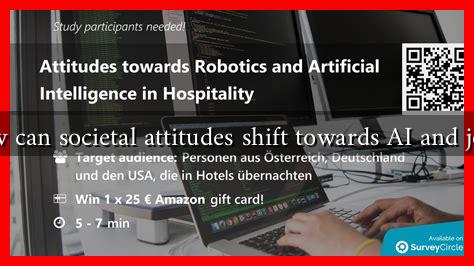-
Table of Contents
- How Can Societal Attitudes Shift Towards AI and Jobs?
- The Current Landscape of AI and Employment
- Understanding Societal Attitudes
- Strategies for Shifting Attitudes
- 1. Promoting Education and Training
- 2. Encouraging Positive Media Narratives
- 3. Engaging Stakeholders
- Case Studies: Successful Attitude Shifts
- Conclusion: Embracing the Future of Work
How Can Societal Attitudes Shift Towards AI and Jobs?
As artificial intelligence (AI) continues to evolve and integrate into various sectors, societal attitudes towards its impact on jobs are becoming increasingly complex. While some view AI as a threat to employment, others see it as an opportunity for innovation and growth. Understanding how these attitudes can shift is crucial for fostering a more positive outlook on the future of work in an AI-driven world.
The Current Landscape of AI and Employment
AI technologies are transforming industries by automating tasks, enhancing productivity, and creating new job opportunities. However, the fear of job displacement remains prevalent. According to a report by McKinsey, up to 375 million workers globally may need to switch occupational categories due to automation by 2030. This statistic highlights the urgency of addressing societal concerns regarding AI and employment.
Understanding Societal Attitudes
Societal attitudes towards AI and jobs can be influenced by various factors, including:
- Education and Awareness: A lack of understanding about AI technologies can lead to fear and resistance. Educational initiatives can help demystify AI and its applications.
- Media Representation: The portrayal of AI in popular media often emphasizes dystopian scenarios, which can skew public perception. Positive narratives can help shift attitudes.
- Personal Experience: Individuals who have experienced job displacement due to automation may harbor negative feelings towards AI, while those who have benefited from AI innovations may view it more favorably.
Strategies for Shifting Attitudes
To foster a more positive societal attitude towards AI and its impact on jobs, several strategies can be employed:
1. Promoting Education and Training
Investing in education and training programs is essential for preparing the workforce for an AI-driven future. This includes:
- Upskilling and reskilling initiatives to help workers transition into new roles.
- Incorporating AI literacy into school curriculums to prepare future generations.
- Offering community workshops and online courses to increase accessibility to AI knowledge.
2. Encouraging Positive Media Narratives
Media plays a significant role in shaping public perception. Encouraging positive narratives about AI can help alleviate fears. This can be achieved by:
- Highlighting success stories of businesses that have effectively integrated AI.
- Showcasing how AI can enhance human capabilities rather than replace them.
- Promoting documentaries and articles that focus on the benefits of AI in various sectors.
3. Engaging Stakeholders
Collaboration among various stakeholders is crucial for addressing concerns about AI and jobs. This includes:
- Governments creating policies that support workers affected by automation.
- Businesses investing in employee development and fostering a culture of innovation.
- Nonprofits and educational institutions partnering to provide resources and support for displaced workers.
Case Studies: Successful Attitude Shifts
Several organizations and countries have successfully shifted societal attitudes towards AI:
- IBM’s SkillsBuild: This initiative offers free training in AI and other digital skills, helping individuals gain the knowledge needed to thrive in a changing job market.
- Estonia’s Digital Society: Estonia has embraced digital transformation, integrating AI into public services while ensuring that citizens are educated about these technologies.
Conclusion: Embracing the Future of Work
Shifting societal attitudes towards AI and jobs is essential for navigating the complexities of an evolving workforce. By promoting education, encouraging positive media narratives, and engaging stakeholders, we can foster a more optimistic outlook on the future of work. As we embrace AI, it is crucial to remember that technology should enhance human potential, not diminish it. With proactive measures, society can adapt to the changes brought about by AI, ensuring that the workforce is prepared for the opportunities that lie ahead.
For more insights on the impact of AI on jobs, you can visit McKinsey’s Future of Work.

